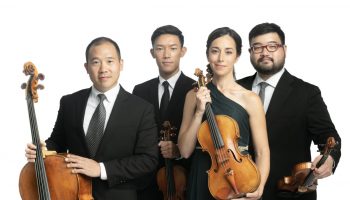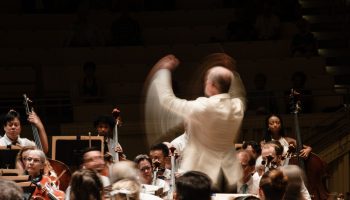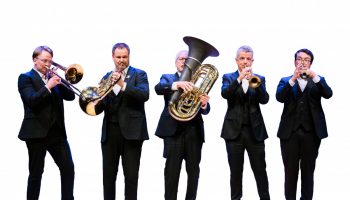
Gabriel Weber
Staff Writer
The Poiesis Quartet will debut their first commissioned piece by Kevin Lau at 4 p.m. today in Elizabeth S. Lenna Hall as part of the Chautauqua Chamber Music Guest Artist Series. Along with Lau’s String Quartet No. 7, the Poiesis Quartet will perform Joseph Haydn’s String Quartet in D Major, Op. 71, No. 2; Sky Macklay’s “Many, Many Cadences;” and Béla Bartók’s String Quartet No. 5.
Lau will be in attendance for the concert for his piece’s world premiere. The piece is incredibly meaningful to have an opportunity to perform, Lau said, as it’s an exploration of grief and catharsis.
At only two months old, Lau’s son Robin was diagnosed with a serious disease requiring a liver transplant. Robin prevailed, and he and his family were able to return home after a fearful six months; Lau composed this work a month after the experience in response to the mark it left on his identity.
“It means a lot for us to be responsible in delivering that story and those experiences that are so personal to Kevin and his family. It’s such a beautiful whirlwind piece of music that definitely embodies catharsis in every way,” said Poiesis Quartet violinist Sarah Ying Ma. “There’s grief, excitement, hope and fear, all at the same time, but ultimately, the piece ends very virtuosically with a lot of joy and defiance. (Lau) talked about how the piece was a way for him to explore gratitude, the joy for family and what really matters in our lives.”
With Ma and Max Ball on violin, Jasper de Boor on viola, and Drew Dansby on cello, the Poiesis Quartet has been labeled as a “quartet to watch” by Hyde Park Herald. They’ve won the Grand Prize and Lift Every Voice Prize for the 2023 Fischoff National Chamber Music Competition, and received the Gold Medal and BIPOC Prize at the 2023 St. Paul String Quartet Competition.
The Poiesis Quartet and Lau are no strangers; since its founding in 2022, another one of Lau’s pieces — String Quartet No. 3 — has been in the quartet’s repertoire, as his writing style works so well with the ensemble.
“He’s a very cinematic composer and very free flowing structurally; it features a lot of individual voices coming through,” Ma said. “That style and energy of playing accommodates our natural instincts.”
Haydn’s String Quartet in D major is also special to the group because it’s among the first set of Haydn’s string quartets released to the public. There is an increased element of playfulness, Ma said, that works well with introducing the youthfulness and ideas that are precedent now for string quartets.
Macklay’s “Many, Many Cadences” is true to its name; the entire piece is back-to-back cadences. Composed at an extraordinarily fast tempo, Ma said, it explores the disintegration of harmony and pokes fun at the use of traditional harmony, while still honoring that fundamental groundwork that is essential to all of music.
Bartók’s String Quartet No. 5, which is the first piece the quartet played together, closes today’s program. While Bartók and Haydn are two of the biggest pillars for the string quartet, Ma said, the combination with Macklay and Lau’s music style allows for a full exploration of quartet harmony.
The Poiesis Quartet aims to provide a platform for many different kinds of genres and composers. Their name is derived from the ancient Greek word πoıԑĩv, which means “to make,” specifically, to create something that has not existed before.
“We aim to kind of reach audiences through our repertoire and performance as much as we can,” Dansby said. “Putting our own emotions and ideas into our performance, while being so in sync with each other and trusting each other to the fullest extent, is kind of creating something new in every performance because it enables every performance to be different. Audiences can tell if we’re in that state of vulnerability and trust. It reaches them more.”
Recently, the quartet did a collaboration with Junious “Jay” Ward, poet laureate of Charlotte, North Carolina, in which every piece was interwoven with live poetry.
“I had tears in my eyes on stage,” Ma said. “To bring music in conversation with words, and then to have so many different inspirations and genre influences within the music, really felt like there was a whole universe coming together in the concert room. That type of artistic creation is really important for us to create and to see in the artistic world. It enhances the experience tenfold for us to be able to engage with a multitude of ideas at the same time.”
Ma finds that audiences are hungry for these kinds of interdisciplinary connections, but they often don’t realize it until the performance.
“We love when what we’re doing is really unexpected to people. I think the most moving concert is when it’s totally something that I didn’t think I needed, but deep down, I really did,” Ma said. “I love going to performances like that, and I think that that experience is really missing from traditional concert halls.”
Creativity in collaboration is something that Poiesis centers in their educational outreach, as well. They don’t alter their repertoire at all when playing for children because the music is already imbued in the genres kids are interested in — whether they realize it or not.
“We love playing for kids because they are constantly giving us new ideas, too, and teaching us about different interpretations of our own music,” Ma said. “That energy and youthful urge for curiosity and self-discovery is just a constant priority for us in any concert that we program, no matter the venue or the type of venue.”
However, their biggest priority is group chemistry. When a quartet member does something unexpected in a concert, the other musicians are immediately there for them, Ma said, which takes years of understanding and emotional involvement in each other’s well-being.
“It deserves a place above number one,” Ma said. “I can’t emphasize enough how we’re basically like four people who are married, and also our instruments are our kids; we’re so integrated into each other’s psyches.”




